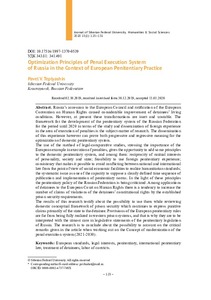Показать сокращенную информацию
Optimization Principles of Penal Execution System of Russia in the Context of European Penitentiary Practice
| Автор | Teplyashin, Pavel V. | en |
| Автор | Тепляшин, П.В. | ru_RU |
| Дата внесения | 2020-01-30T04:40:35Z | |
| Дата, когда ресурс стал доступен | 2020-01-30T04:40:35Z | |
| Дата публикации | 2020-01 | |
| URI (для ссылок/цитирований) | https://elib.sfu-kras.ru/handle/2311/129911 | |
| Аннотация | Russia’s accession to the European Council and ratification of the European Convention on Human Rights caused considerable improvement of detainees’ living conditions. However, at present these transformations are inert and unstable. The framework for the development of the penitentiary system of the Russian Federation for the period until 2020 in terms of the study and dissemination of foreign experience in the area of execution of penalties is the subject-matter of research. The dissemination of this experience however can prove both progressive and regressive meaning for the optimization of domestic penitentiary system. The use of the method of legal-comparative studies, stressing the importance of the European example in execution of penalties, gives the opportunity to add some principles to the domestic penitentiary system, and among them: reciprocity of mutual interests of personality, society and state; feasibility to use foreign penitentiary experience; consistency that makes it possible to avoid conflicting between national and international law from the point of view of social economic facilities to realize humanitarian standards; the systematic issue as one of the capacity to suppose a clearly defined time sequence of publication and implementation of penitentiary norms. In the light of these principles the penitentiary policy of the Russian Federation is being criticized. Among applications of detainees to the European Court on Human Rights there is a tendency to increase the number of claims of violations of the detainees’ constitutional rights by the established prison security requirements. The results of this research testify about the possibility to use them while reviewing domestic conceptual framework of prison security which continues to express punitive claims primarily of the state to the detainee. Provisions of the European penitentiary rules are far from being fully realized in western prison systems, and that is why they are to be interpreted with the utmost care in legislative statements of the penitentiary legislation of Russia. The research is to conclude about the possibility to account on the critical remarks given in the article when working out on the Concept of modernization of the penal execution system (2021-2030) | en |
| Аннотация | Вступление России в Совет Европы и ратификация Европейской Конвенции по правам человека привели к значительным преобразованиям условий содержания осужденных. Однако такие преобразования в настоящее время стали носить инертный и нестабильный характер. Предметом исследования выступают положения Концепции развития уголовно-исполнительной системы Российской Федерации до 2020 г. в части изучения и распространения зарубежного опыта в сфере исполнения наказаний. Однако распространение такого опыта способно оказать как положительное (прогрессирующее), так и отрицательное (регрессирующее) значение для оптимизации отечественной уголовно-исполнительной системы. Использование метода сравнительного правоведения и учет европейского опыта исполнения уголовных наказаний позволяют дополнить отечественную уголовно- исполнительную политику рядом принципов, среди которых: взаимный учет интересов личности, общества и государства; целесообразность использования зарубежного пенитенциарного опыта; согласованность, позволяющая избежать противоречий между национальным и международным правом с точки зрения социально-экономических возможностей реализации гуманитарных стандартов; системность, предполагающая четко определенную временную последовательность издания и реализации уголовно-исполнительных норм. Сквозь призму этих принципов критикуется уголовно-исполнительная политика Российской Федерации. Отмечается тенденция роста среди обращений осужденных в Европейский суд по правам человека жалоб на нарушение ряда конституционных прав этих лиц установленными режимными требованиями. Результаты исследования свидетельствуют о возможности их применения при пересмотре отечественных концептуальных основ режима, который в настоящее время продолжает выражать в первую очередь карательные притязания государства к осужденному лицу. Положения Европейских пенитенциарных правил далеко не в полной мере реализуются в западных тюремных системах, поэтому следует их крайне осторожно интерпретировать в законодательных конструкциях уголовно- исполнительного законодательства России. Сделан вывод о возможности учета изложенных в статье критических замечаний при разработке Концепции модернизации уголовно-исполнительной системы (2021-2030 гг.) | ru_RU |
| Язык | en | en |
| Издатель | Сибирский федеральный университет. Siberian Federal University | en |
| Тема | European standards | en |
| Тема | legal interests | en |
| Тема | penitentiary | en |
| Тема | international penitentiary law | en |
| Тема | treatment of detainees | en |
| Тема | labor of convicts | en |
| Тема | европейские стандарты | ru_RU |
| Тема | законные интересы | ru_RU |
| Тема | исправительное учреждение | ru_RU |
| Тема | международное пенитенциарное право | ru_RU |
| Тема | обращение с заключенными | ru_RU |
| Тема | труд осужденных | ru_RU |
| Название | Optimization Principles of Penal Execution System of Russia in the Context of European Penitentiary Practice | en |
| Альтернативное название | Принципы оптимизации уголовно-исполнительной системы России в контексте европейской пенитенциарной практики | ru_RU |
| Тип | Journal Article | en |
| Контакты автора | Teplyashin, Pavel V.: Siberian Federal University Krasnoyarsk, Russian Federation; pavlushat@mail.ru; ORCID: 0000-0002-6737-749X | en |
| Контакты автора | Тепляшин, П.В.: Сибирский федеральный университет Российская Федерация, Красноярск | ru_RU |
| Страницы | 123–131 | ru_RU |
| DOI | 10.17516/1997-1370-0539 | |
| Журнал | Журнал Сибирского федерального университета. Гуманитарные науки. Journal of Siberian Federal University. Humanities & Social Sciences; 2020 13 (1) | en |

